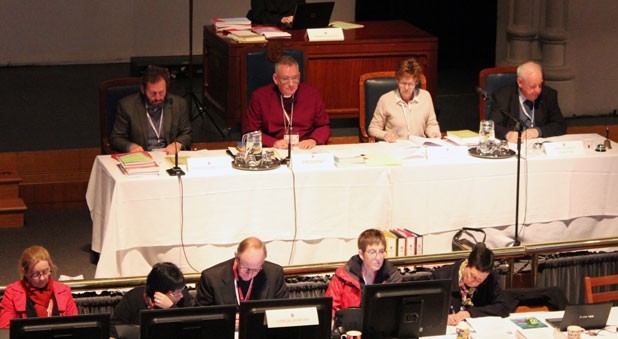General Synod has upheld a requirement for at least one person to be baptised before a couple can be married in church.
The debate was one of several bills considered on the first day of the Synod, meeting at St Peter's School in Adelaide.
Under the current (1981) marriage canon, the marriage cannot be solemnized “unless at least one of the parties to be married has been baptised”.
Leading the move for reform, Sydney Archbishop Glenn Davies argued that the requirement was a 16th century addition and not scriptural.
“Marriage is an ordinance of creation not a regulation of the church; it may be entered outside the sphere of faith, and when entered from within the sphere of faith it does not change its essential character” Dr Davies wrote in a submission. “In a day when less than half of all marriages are conducted as church ceremonies, it (the requirement) is hardly evangelistically enterprising or pastorally sensitive.”
The Archbishop’s motion was supported by Sydney’s Justice Peter Young.
“Why should we not welcome those who seek a blessing in our church?” Justice Young said.
Speaking against the motion, Canon Andrew McGowan of Melbourne told the Synod “The liturgical patrimony that we’ve been given in the Book of Common Prayer and in its successors that are authorised for use in our church, assume faith on behalf of those who come for baptism...and I think there is a danger that if we authorise a situation where unbaptised persons are married under our current liturgies, including that of the Book of Common Prayer or that of other authorised liturgies in our church, we will be encouraging people, in effect, to lie for Jesus.”
Archbishop Roger Herft of Perth also opposed the bill, speaking of his time in ministry in countries where Christianity was a minority religion. “When you did ask people either of the Buddhist, Hindu or Islamic faith who wanted to get married in a church, when you did ask them about baptism and the christian faith and went through the liturgy they were going to say yes to, baptism then became a reality for them - a costly reality in terms of the vows they were to make.”
In reply, Dr Davies described the issue as theological, pastoral and missiological. He told the Synod each of the concerns expressed against the reform "are hoisted on their own petard, because you have got one person unbaptised and one person baptised, how then can the liturgy function? The problem exists already."
The bill passed in the House of Laity but failed to get the required majority in the House of Clergy.
Sydney Diocese operates under a different marriage canon, which does not have the baptism requirement.




















